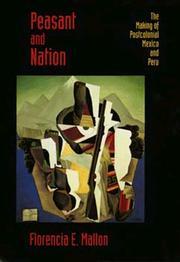| Listing 1 - 10 of 13 | << page >> |
Sort by
|
Book
ISBN: 128343119X 9786613431196 0822394855 0822351528 0822351374 Year: 2012 Publisher: Durham, NC : Duke University Press,
Abstract | Keywords | Export | Availability | Bookmark
 Loading...
Loading...Choose an application
- Reference Manager
- EndNote
- RefWorks (Direct export to RefWorks)
An interdisciplinary collection that addresses the racial and ethnic politics of knowledge production and indigenous activism in the Americas, this book analyzes the relationship of language to power and advocates for collaboration between community members, scholars, and activists that prioritize the right of Indigenous people to decide how their knowledge is used.
Language and languages --- Language and culture --- Indigenous peoples and mass media --- Mass media and indigenous peoples --- Mass media --- Culture and language --- Culture --- Political aspects. --- Language and languages Political aspects --- Political aspects --- Mass media and Indigenous peoples

ISBN: 0520085051 0520085043 Year: 1995 Publisher: Berkeley University of California press
Abstract | Keywords | Export | Availability | Bookmark
 Loading...
Loading...Choose an application
- Reference Manager
- EndNote
- RefWorks (Direct export to RefWorks)
Nationalism --- Peasants --- Political culture --- History --- Nationalisme --- Paysannerie --- Histoire --- Hitoire --- Mexico --- Peru --- Mexique --- Pérou --- Politics and government --- Politique et gouvernement --- Consciousness, National --- Identity, National --- National consciousness --- National identity --- International relations --- Patriotism --- Political science --- Autonomy and independence movements --- Internationalism --- Political messianism --- Culture --- Peasantry --- Agricultural laborers --- Rural population --- Marks (Medieval land tenure) --- Villeinage
Book
ISBN: 0691076472 1306990580 9781400856046 1400856043 9780691076478 9780691101408 069110140X 0691613125 9780691613123 Year: 2014 Publisher: Princeton, NJ
Abstract | Keywords | Export | Availability | Bookmark
 Loading...
Loading...Choose an application
- Reference Manager
- EndNote
- RefWorks (Direct export to RefWorks)
Florencia E. Mallon examines the development of capitalism in Peru's central highlands, depicting its impact on peasant village economy and society. She shows that the region's peasantry divided into an agrarian bourgeoisie and a rural proletariat during the period under discussion, although the surviving peasant ideology, village kinship networks, and the communality inspired by economic insecurity have sometimes obscured this division.Originally published in 1983.The Princeton Legacy Library uses the latest print-on-demand technology to again make available previously out-of-print books from the distinguished backlist of Princeton University Press. These editions preserve the original texts of these important books while presenting them in durable paperback and hardcover editions. The goal of the Princeton Legacy Library is to vastly increase access to the rich scholarly heritage found in the thousands of books published by Princeton University Press since its founding in 1905.
Peasants --- Economic development --- Capitalism --- Business & Economics --- Real Estate, Housing & Land Use --- Market economy --- Economics --- Profit --- Capital --- Development, Economic --- Economic growth --- Growth, Economic --- Economic policy --- Statics and dynamics (Social sciences) --- Development economics --- Resource curse --- Peasantry --- Agricultural laborers --- Rural population --- Marks (Medieval land tenure) --- Villeinage --- History --- Cordillera Central Region (Peru) --- Rural conditions --- E-books --- Capitalism -- Peru -- Cordillera Central Region. --- Cordillera Central Region (Peru) -- Rural conditions. --- Economic development. --- Peasants -- Peru -- Cordillera Central Region -- History. --- History. --- Rural conditions.

ISBN: 0520914678 0585128871 9780520914674 9780585128870 9780520085046 0520085043 9780520085053 0520085051 0520085043 0520085051 Year: 1995 Publisher: [Place of publication not identified] University of California Press
Abstract | Keywords | Export | Availability | Bookmark
 Loading...
Loading...Choose an application
- Reference Manager
- EndNote
- RefWorks (Direct export to RefWorks)
Peasant and Nation offers a major new statement on the making of national politics. Comparing the popular political cultures and discourses of postcolonial Mexico and Peru, Florencia Mallon provides a groundbreaking analysis of their effect on the evolution of these nation states. As political history from a variety of subaltern perspectives, the book takes seriously the history of peasant thought and action and the complexity of community politics. It reveals the hierarchy and the heroism, the solidarity and the surveillance, the exploitation and the reciprocity, that coexist in popular political struggle. With this book Mallon not only forges a new path for Latin American history but challenges the very concept of nationalism. Placing it squarely within the struggles for power between colonized and colonizing peoples, she argues that nationalism must be seen not as an integrated ideology that puts the interest of the nation above all other loyalties, but as a project for collective identity over which many political groups and coalitions have struggled. Ambitious and bold, Peasant and Nation both draws on monumental archival research in two countries and enters into spirited dialogue with the literatures of post-colonial studies, gender studies, and peasant studies.
Peasants --- Political culture --- Nationalism --- Mexico --- Regions & Countries - Americas --- History & Archaeology --- Consciousness, National --- Identity, National --- National consciousness --- National identity --- International relations --- Patriotism --- Political science --- Autonomy and independence movements --- Internationalism --- Political messianism --- Culture --- Peasantry --- Agricultural laborers --- Rural population --- Marks (Medieval land tenure) --- Villeinage --- History --- Peru --- Politics and government

ISBN: 0822335743 0822335859 Year: 2007 Publisher: Durham Duke University Press
Abstract | Keywords | Export | Availability | Bookmark
 Loading...
Loading...Choose an application
- Reference Manager
- EndNote
- RefWorks (Direct export to RefWorks)
Land grants --- Land reform --- Mapuche Indians --- Land tenure --- Government relations --- History --- Chile --- Nicolás Ailío (Chile) --- Politics and government. --- Race relations. --- History. --- Social conditions.
Book
ISBN: 0822387263 Year: 2005 Publisher: Durham, N.C. : Duke University Press,
Abstract | Keywords | Export | Availability | Bookmark
 Loading...
Loading...Choose an application
- Reference Manager
- EndNote
- RefWorks (Direct export to RefWorks)
Follows the history of an indigenous community in southern Chile across the 20th century, using oral history and archival material to analyze the shifting relationship between the Mapuche people and the Chilean state.
Mapuche Indians --- Land grants --- Land reform --- History. --- Land tenure --- Government relations. --- Nicolás Ailío (Chile) --- Chile --- Politics and government. --- Social conditions. --- Race relations.
Book
Year: 2014 Publisher: [Place of publication not identified] Princeton University Press
Abstract | Keywords | Export | Availability | Bookmark
 Loading...
Loading...Choose an application
- Reference Manager
- EndNote
- RefWorks (Direct export to RefWorks)
Peasants --- Economic development --- Capitalism --- History
Digital
ISBN: 9781400856046 9780691613123 Year: 2014 Publisher: Princeton, N.J. Princeton University Press
Abstract | Keywords | Export | Availability | Bookmark
 Loading...
Loading...Choose an application
- Reference Manager
- EndNote
- RefWorks (Direct export to RefWorks)
Book
ISBN: 1478092149 Year: 2011 Publisher: [s.l.] : Duke University Press,
Abstract | Keywords | Export | Availability | Bookmark
 Loading...
Loading...Choose an application
- Reference Manager
- EndNote
- RefWorks (Direct export to RefWorks)
Decolonizing Native Histories is an interdisciplinary collection that grapples with the racial and ethnic politics of knowledge production and indigenous activism in the Americas. It analyzes the relationship of language to power and empowerment, and advocates for collaborations between community members, scholars, and activists that prioritize the rights of Native peoples to decide how their knowledge is used. The contributors-academics and activists, indigenous and nonindigenous, from disciplines including history, anthropology, linguistics, and political science-explore the challenges of decolonization. These wide-ranging case studies consider how language, the law, and the archive have historically served as instruments of colonialism and how they can be creatively transformed in constructing autonomy. The collection highlights points of commonality and solidarity across geographical, cultural, and linguistic boundaries and also reflects deep distinctions between North and South. Decolonizing Native Histories looks at Native histories and narratives in an internationally comparative context, with the hope that international collaboration and understanding of local histories will foster new possibilities for indigenous mobilization and an increasingly decolonized future.

ISBN: 1282920464 9786612920462 0822384213 0822329344 082232962X Year: 2002 Publisher: Durham [N.C.] : Duke University Press,
Abstract | Keywords | Export | Availability | Bookmark
 Loading...
Loading...Choose an application
- Reference Manager
- EndNote
- RefWorks (Direct export to RefWorks)
Testimonial text by a Mapuche woman, with commentary and other ethnographic interventions by a U.S. historian.
Mapuche women --- Feminists --- Women social reformers --- Mapuche Indians --- Araucanian Indians --- Araucano Indians --- Araukan Indians --- Auca Indians (Chile) --- Aucan Indians --- Aucanian Indians --- Maluche Indians --- Mapudungu Indians --- Mapunche Indians --- Vilimuluche Indians --- Indians of South America --- Women, Mapuche --- Women --- Social reformers --- Feminism --- Social conditions. --- Land tenure. --- Politics and government. --- Reuque Paillalef, Rosa Isolde, --- Paillalef, Rosa Isolde Reuque, --- Chile --- History --- Politics and government
| Listing 1 - 10 of 13 | << page >> |
Sort by
|

 Search
Search Feedback
Feedback About UniCat
About UniCat  Help
Help News
News